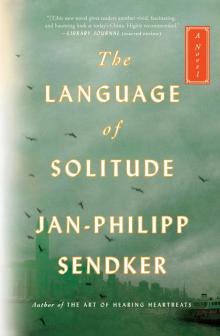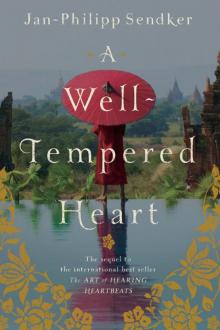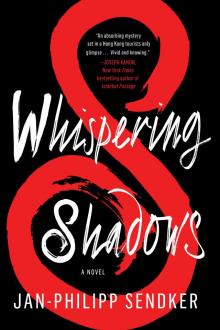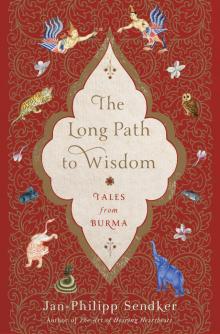- Home
- Jan-Philipp Sendker
The Art of Hearing Heartbeats Page 5
The Art of Hearing Heartbeats Read online
Page 5
Tin Win’s life had not spanned twenty-one days when, at least from his mother’s perspective, its whole course had been decided. Lived. Forfeited. Now it was just a question of her getting through the rest of it gracefully.
It would prove too much.
Chapter 10
NOW THAT THE stars had spoken and her child’s fate was determined, Mya Mya slept more soundly. She knew what to expect. She felt right at home with strokes of fate and ill fortune. Happiness and joy made her nervous, strange and unfamiliar as they were. She needn’t plague herself with false hopes. There were no illusions gnawing at her soul, no dreams making her fancy run wild. That calmed her.
So now, in the days and weeks after the visit to the astrologer, it was Khin Maung who lay awake beside his sleeping wife and child while the most hideous thoughts wrought their mischief in his mind. Perhaps the old man had made a mistake? Was there really such a thing as a fate we could not escape? If we were not the masters of our lives, then who was? He had no wish to listen to the stars.
“Mya Mya. Mya Mya,” he said, sitting up in bed that first night. His wife lay sleeping next to him.
“Mya Mya.” It sounded like an incantation.
She opened her eyes.
There was a full moon, a cloudless night, and in the sickly light that fell through the window from outside he saw the outline of her face, the movements of her eyes, the slender nose. He thought how beautiful she was and that it had never occurred to him before. He had married her because his parents had selected her for him. Love will come later, they had assured him, and he had believed them—for one because he always did whatever they told him, and then also because he had only very vague notions about love. He considered it a gift, a boon bestowed on some and not on others. No one was entitled to it.
“Mya Mya, we have to, we ought to, we must not …” There was so much he wanted to say to her.
“I know, Khin Maung,” she said, sitting up. “I know.”
She crept to him, took his head in her arms, and pressed it to her bosom. A rare gesture for Mya Mya, for whom tenderness was a luxury as profligate as hot water in the morning or a smile when parting. It was something for dreamers or for people with an excess of time, power, and emotions. She did not belong to either category.
Mya Mya thought she knew what was going on inside her husband, and she pitied him. By his heartbeat, by the convulsions of his body, by the way he wrapped his arms around her, she sensed that he would need time. He still believed they could protect themselves, that there might still be a chance to alter what could no longer be altered.
Khin Maung lay in her arms and talked. Not loudly, not to her. She couldn’t understand a word he said. He was talking to himself, swiftly and without pause. His whispering sounded demanding, defiant, almost threatening, then pleading, beseeching, doubtful, a stream of talk that would not run dry. It was as if he were sitting at someone’s deathbed and only his voice could keep the patient alive.
He wanted to fight for his son. Every life held promise, he told himself, and in his son’s case, he, Khin Maung, would explore every possibility to realize that promise. If it must happen without his wife’s help, then so be it.
That’s what he wanted to tell her, first thing in the morning, even before breakfast. Then he fell asleep.
But the opportunity for a discussion never materialized, either before breakfast or in the evening after the day’s work.
The following night he recalled every detail of their visit to the astrologer. The house appeared before his eyes, blurry at first, then clearer and clearer, like a landscape when the fog lifts. He saw the room, the candles, the sticks of incense, the slate that revealed the mysteries of life. The great book of love. He heard the old man’s pronouncements, let them amble through his mind, slowly, word by word. There had been no talk of a curse. He would speak with his wife. Early tomorrow morning. The opportunity never presented itself.
So passed the nights. And the days. If Khin Maung had been a different person, he would not have waited for an opportunity; he would have looked for one and seized it. But that was not in his nature. He would have had to transcend limitations, his own limitations, and he was no hero. He could allow himself only the thoughts, and it was not long before his strength was spent. The doubts returned, and with his resistance broken, they fell on him like rats and vultures on carrion. The stars had it right. On a Saturday in December. Great sorrow in various respects. It could hardly have been plainer.
On the heels of the chicken incident, a great-aunt passed away—eight weeks to the day after the birth of the boy. She had been, admittedly, quite old and sick and had not left her hut in years, and for a brief moment Khin Maung had wanted to point these things out to his wife. A brief moment—then he also saw the sign and could not contradict his wife.
And so he withdrew from the life of his son, consoling himself with the thought that the boy would, after all, be only the first of many children that he, Khin Maung, would have with Mya Mya, and that not all of them would come into the world on a Saturday in December, April, or August. He leased out his field and took work as a gardener and caddy at the golf course of the English. That work paid better than farming and also allowed him to avoid his own house even in the dry season, when farmers had little work to do in the field. Golf was a year-round pursuit.
Mya Mya buried herself in her housekeeping. The family lived in a small hut of wood and mud behind a grand two-story villa belonging to a distant uncle of Khin Maung. It stood on a hilltop above the village, and like most of the houses of the colonial lords in Kalaw, it was built in a Tudor style. The town was especially popular during the dry season. When temperatures in the capital, Rangoon, and in Mandalay topped a hundred degrees, Kalaw, with an elevation of more than four thousand feet, offered relief from the heat of the flats and the delta. There were English nationals who stayed in the country after their retirement and who relocated to one of the mountain resorts such as Kalaw. An English officer had built himself this villa as a place to retire, but then tragically had not returned from a tiger hunt undertaken just two weeks after his release from His Majesty’s service.
The man’s widow had sold the house to Khin Maung’s uncle, who had won respect and a handsome fortune as a rice baron in Rangoon. He was one of the few who had managed to establish himself in a market dominated by an Indian minority, and he was one of the richest Burmese in the country. The villa had no practical value to him. In the six years he had owned it he had never yet seen it. Instead it was a token of his wealth, a status symbol the mere mention of which was calculated to impress his business associates in the capital. It was Mya Mya and Khin Maung’s responsibility to look after the property and to maintain it as if the master of the house might arrive at any moment. Since the birth of her son, Mya Mya had dedicated all her energy to this task. She polished the wooden floors every day, as if the point were to transform them into mirrors. She dusted the shelves in the morning, and in the evening she dusted them again, though not a visible speck of dust had settled on them in the intervening twelve hours. She washed the windows every week and trimmed the lawn with a pair of scissors, which was more thorough than using the lawn mower. She kept the effusive bougainvilleas in check and tended the flower beds passionately.
Mya Mya saw the two policemen coming up the hill. She was standing by the kitchen scrubbing carrots. It was one of those cold, clear December days, and Mya Mya was in a hurry. She had taken too much time polishing the floors on the second story and was worried now that she would no longer finish the kitchen that afternoon, and if the master should arrive tomorrow, he would not find his estate in immaculate condition, and then all the work of the previous years would have been for nothing because he would think that Mya Mya had not been maintaining his property. One day of disarray can count for more than a thousand days of order, she thought, looking into the valley.
Coming up the hill, the officers in their crisp blue uniforms had not followed the road
used by oxcarts and the occasional car. Instead they had taken the narrow footpath that wound in tight serpentines first through the pine wood and then among the fields up to the hilltop. Mya Mya saw the men approaching, saw their faces, and felt her panic mounting. It was Tin Win’s sixth birthday, and she had always been firmly convinced that especially on the anniversaries of his birth she had to be ready for just about any kind of catastrophe.
Within the space of two breaths dread had taken hold of her, of her soul, of her mind, of her body. Her stomach and intestines contracted as if wrung by giant hands. Tighter and tighter. She gasped for breath. She heard herself whimpering. She heard herself pleading. She heard herself begging. Let it not be true.
The men opened the gate, stepped into the yard, and closed the gate behind them. Slowly they walked over to Mya Mya. She sensed the reluctance in their movements. Each step was like a kick to her body. The younger of the two kept his head lowered. The older one looked her in the eye. She knew him from brief encounters in the village. Their eyes met, and for the duration of a heartbeat Mya Mya was able to read his gaze. That sufficed. She knew everything, and the dread, the monster that had been devouring her, disappeared as quickly as it had come. She knew that a terrible calamity had befallen her, that no one would ever be able to unmake it, that nothing in her life would ever be as it had been, that this was happening for the third time now, and that she did not have the strength to bear it.
The policemen stood in front of her, the younger one still not daring to lift his head.
“Your husband’s had an accident,” the older one said.
“I know,” said Mya Mya.
“He’s dead.”
Mya Mya said nothing. She did not sit down. She did not cry. She did not break out in lamentation. She said nothing.
She heard the men saying something about an accident, about a golf ball apparently driven off course by the wind. Right in the temple. Dead on the spot. The Englishman will take over the funeral expenses. A small compensation. No acknowledgment of any guilt. A gesture of sympathy. Nothing more. Mya Mya nodded.
When the officers had left she turned around and looked for her son. He sat alone behind the house, playing. Next to him lay a great pile of pinecones. He was trying to throw them into a hole he had dug a few yards away. Most of them far overshot their target.
Mya Mya wanted to call to him, to tell him of his father’s death. But why? Presumably he already knew about it. He was, after all, the one who had brought on the calamity, and Mya Mya noticed how for the first time she was admitting that she blamed him for it. It was not merely the inauspicious arrangement of the stars; it was Tin Win, that inconspicuous boy with his black hair, those enigmatic eyes so inscrutable that she never knew whether he was really looking at her. She could read nothing in them. It was he who had brought on the misfortune, he who had wrought the havoc. He created it the way other children built caves or played hide-and-seek.
Mya Mya wanted somehow to leave it all behind. She wanted never to see that child again.
Over the course of the next thirty-six hours she operated the way a person does who has only one goal in mind, a goal that drives her, a goal she serves above all else. She played the mourning widow, received neighbors and friends, organized the burial for the next day, stood before her husband’s open grave, and watched the wooden casket vanish into the earth.
The next morning she packed her few belongings—a couple of blouses and longyis, a second pair of sandals, a comb, a hair clip—in an old bag for golf balls her husband had once brought home from the club. Tin Win stood mute beside his mother, watching.
“I have to go away for a few days,” she said without looking up.
Her son said nothing.
She left the house. Her son ran after her. She turned around, and he stood still.
“You can’t come,” she said.
“When are you coming back?” he asked.
“Soon,” she said.
Mya Mya turned away and walked to the garden gate. She heard his light steps behind her. She turned around.
“Didn’t you hear what I told you?” she said loudly and in a sharp tone.
Her son nodded.
“You stay here.” She pointed to the sawn-off stump of a pine tree. “You can sit there and wait for me.”
Tin Win ran to the old tree stump and clambered onto it. From there he had a good view of the path leading to their house. Mya Mya set off again, opening and closing the garden gate without turning around. Walking quickly, she took the road into the village below.
Tin Win watched her go. He saw her walk through the fields and into the wood. This was a good spot. From here he would be able to see his mother coming even from a long way off.
Chapter 11
TIN WIN WAITED.
He waited the rest of that day and night. He squatted on the flat tree stump, feeling neither hunger nor thirst, nor even the cold that settled over the mountains and valleys in the evening. It passed over him without touching him, like a bird over a clearing.
He waited the next day. He watched it get dark and then watched as the fence and the bushes and the fields reemerged out of darkness. He gazed into the distance, where the trees stood on the edge of perception. That’s where his mother would be coming from, and with her red jacket he would recognize her even from afar, and he would scramble down the tree stump, climb over the fence, and run to her. He would cry out loudly with joy, and she would kneel down and wrap him in her arms and press him to her. Very firmly.
That’s how he often pictured the scene to himself—when playing alone and dreaming—even though Mother and Father never actually bent down to pick him up, not even when he stood in front of them, hugging their legs. He sensed their reluctance even to touch him. It was his fault; there was no doubt about that. It was a punishment, a just one, only he didn’t know what for, and he hoped that whatever the crime, the period of atonement would soon be over. This hope was more fervent than ever now that they had laid his cold, stiff father in a casket of wood and buried him deep in a hole. His longing for his mother and her love compelled him to tough it out on that tree stump, to wait patiently for the red dot on the horizon.
On the third day a neighbor brought him water and a bowl of rice with vegetables and asked whether he wouldn’t prefer to wait at her house. He shook his head vehemently. As if going there might cause him to miss his mother. He didn’t touch the food. He wanted to save it for her, to share with her when she returned hungry from the long journey.
On the fourth day he sipped at the water.
On the fifth day Su Kyi came, the neighbor’s sister, bringing a pot of tea and more rice and bananas. Preoccupied with his mother, he ate none of that, either. It couldn’t be much longer. Soon, she had said.
On the sixth day he could no longer make out the individual trees. The forest was blurred, as if he had water in his eyes. It looked like a cloth, waving in the wind, mottled with tiny red dots. These came nearer to him and got larger, but they weren’t jackets; they were red balls hurtling violently in his direction. They whistled past him left and right and over his head, so close that he felt their draft. Still others flew straight at him, only to lose their momentum in the last few yards and crash into the ground just inches in front of him.
On the seventh day he squatted stiff and motionless at his post. When Su Kyi saw him she thought he had died. He was cold and white as the hoarfrost that covered the grass in front of the house on many an especially cold January day. His face was sunken, his body like an empty shell, a lifeless cocoon. Only when she got closer could she see that he was breathing, that under his shirt his lean chest was fluttering, like a fish from the market gasping for breath in her kitchen.
Tin Win neither heard nor saw the woman. The world around him was veiled in a milky white fog into which he was slowly but surely vanishing. His heart was pounding. There was still life enough in him, but his hope had faded, and that made him resemble a corpse.
&nb
sp; He felt two hands touching him, lifting him up, hugging him and carrying him away.
It was Su Kyi looking after him. A vigorous older woman with a deep voice and a laugh over which the trials of life had passed without a trace. Her only child had died at birth. Her husband had died later the following year of malaria. After his death she had been forced to sell the hut they had finished building only a short time earlier. Since then she had been living with relatives, more tolerated than welcome. To her family she seemed a crotchety, somewhat unnerving old woman with eccentric views on life and death. In contrast to everyone else, she read no deeper meaning into the misfortunes fate had dealt her. Nor did she believe that unfavorable arrangements of the stars had occasioned her loved ones’ deaths. Instead these losses merely showed that fortune was capricious, a fact one must accept if one was going to love life. And love life she did. She did not have much use for predestination. Happiness might find a home in every individual. She never dared say so out loud, but everyone knew of her convictions, and they made her into Tin Win’s first ally.
Over the years she had frequently observed her neighbors’ son and been astonished at his fair skin, like the light brown of fallen pine needles or eucalyptus leaves. He was so much fairer than his parents. She had watched the child grow into a tall, almost gangly boy, shy like one of the owls she heard calling so often but never spied, a boy she never saw in the company of other children.
She had met him once in the woods. She was on her way into town, and he was sitting under a pine tree watching a small green caterpillar crawl across his hand.
“Tin Win, what are you doing here in the wood?” she asked.
“I’m playing,” he said without looking up.
“Why all alone?”
“I’m not alone.”

 The Language of Solitude
The Language of Solitude A Well-Tempered Heart
A Well-Tempered Heart The Art of Hearing Heartbeats
The Art of Hearing Heartbeats The Far Side of the Night
The Far Side of the Night Whispering Shadows
Whispering Shadows Dragon Games
Dragon Games The Long Path to Wisdom
The Long Path to Wisdom